Enter content here Yellow Cobbles Replaced. Workers started to repair the legendary yellow cobbles in Sofia yesterday. The paving-blocks came out because of the cold and the heavy traffic by the building of the Parliament. The yellow pavement in Sofia is 80 years old and often needs to be repaired. The summer before last, the cobbles succumbed to the heat and came out of place once again. Photo Nikolai Donchev Bulgaria's Magdalena Maleeva screams in delight during her second round match against Kveta Hrdlickova of the Czech Republic at the Australian Open in Melbourne January 16, 2002. Maleeva won in straight sets 6-4, 7-5. (Stuart Milligan/Reuters) The West with a Skeleton in the Closet. Western critics tried to fit a Macedonian film into their own inaccurate picture of the events down there. They even agreed on how to welcome the film two days before they got to see it in Venice! An English critic Alexander Walker - comes up with a brilliant thought: he claims that the goal of Dust is to block Turkeys admission to the EU! The German Der Tagespiegel declared the film anti-Albanian and Neo-Fascist...Photo: Reality Macedonia The "Dust" Files: One Example of How Macedonia Lost the War for Truth. Vest 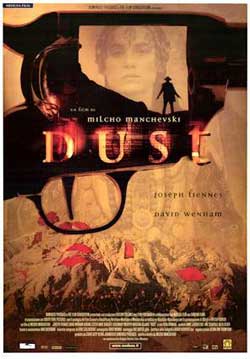
By Marina Kostova
Translated by Aleksandra Ilievska
The Venice critics agreed on how to welcome the film two days before they got to see it!
An English critic Alexander Walker - comes up with a brilliant thought: he claims that the goal of Dust is to block Turkeys admission to the EU!
The German Der Tagespiegel declared the film anti-Albanian and Neo-Fascist, saying: "Instead of the Albanian Muslims we have here the Ottomans as the untermenschen and the Macedonians are as innocent as lambs, which are slaughtered during the film numerously. And the black boy whom the old woman explains the Balkans to, is nobody else than the West, who has to be waken up by the sounds of the fanfare and fight against the everlasting Osmanic Islam."
Western critics tried to fit a Macedonian film into their own inaccurate picture of the events "down there." For the first time ever, a country under attack by imported and local gangs declaring themselves a “Liberation Army” while carrying out ethnic cleansing, murder and outright plunder has been declared racist because it tries to defend the law and order. The US and EU political elites embraced the position of the terrorists in Macedonia, pronouncing them fighters for human rights; consequently, the image of Macedonia in foreign media reports was seen from that perspective. The US and the EU, in fact, used this story in front of their own constituencies to help them hide their responsibility for the spillover of the Kosovo crisis over the border into Macedonia. Macedonia, its political establishment in particular, failed to produce an articulated response to this political and media behavior of the EU and the US. Whatever our politicians told us, they were not heard by the world. The battle for the truth about Macedonia was, and still is, fought outside institutions. It is fought on web sites, such as http://www.realitymacedonia.org.mk/ or www.ok.mk, it is fought by countless personal protests and letters to foreign journalists regarding their reports, letters to European and world politicians and institutions... Ultimately, the only one who called to task the West and asked for accountable behavior in this dangerous situation was Milcho Manchevski. This he did in his article “Just a Moral Obligation” and in numerous interviews he gave before and during the Venice Film Festival for the foreign media. His case is enlightening. Milcho Manchevski on the set of "Dust," during the Summer of 2000. At the end of August, a week before “Dust” opened the Venice Film Festival, Manchevski published an opinion piece in the eminent Sueddeutsche Zeitung entitled “Just a Moral Obligation”. The London Guardian and the Skopje Dnevnik printed the same text; it was also widely distributed on the Internet. (Manchevski did not offer his article to The Guardian. The London-based paper downloaded it from the Internet, changed the title, cut off the end and made several modifications to the body itself. The Slovene film critic Miha Brun published a comparison between the original and the text “fixed” by the editors of The Guardian.) Several lines of Manchevski’s commentary sum up his view: “Macedonia is collateral damage to NATO's involvement in the Balkans. Body bags are not sexy, so NATO chose to let the militants keep their western weapons. NATO's Kosovo escapade did much more than arm and train the militants who now execute a classical blowback. It escalated the conflict in the Balkans to a higher level. The psychological effect of the entire world putting itself on the side of the Great Cause (as seen by the Albanian extremists) has given a boost to their armed secessionist struggle. Ethnic cleansing and occupying territories is an advanced step in redrawing borders. The US has a moral obligation to stop the Albanian extremists from turning Macedonia into another Afghanistan (the article was written in July, two months before September,11) or Cambodia, two sad examples of blowback and collateral damage from American involvement”, - Manchevski writes in “Just a Moral Obligation”. The Moscow Pravda also published this commentary, as did the Belgian De Standaard. The latter paired it up with a “response” from an Albanian reader. De Standaard thus shifted the emphasis of the article from an argument for re-establishing peace to an inter-ethnic debate. In other words, Manchevski’s article echoed around the world as a “defense” of the Macedonian position during a war, much louder even than the voice of the Macedonian government itself (Macedonian government officials’ statements and press-conferences rarely – if ever – received this much attention by the global press). "Dust" or "Saving Private Ryan" To what extent his expose affected Western culture analysts and political analysts became clear in the initial Western media reactions to Manchevski’s film “Dust.” They did not argue directly with his commentary, but instead projected their prejudices concerning Macedonia onto the film. In case we forget – “Dust” was the first Macedonian-made product unveiled to the world on an equal footing during the war. It was our film that opened the Venice Film Festival. 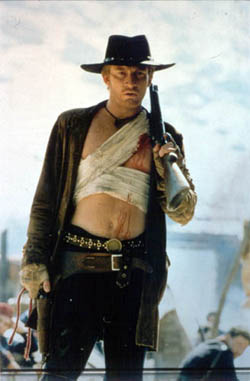
Hardly any regular moviegoer expected the charged reception of the film. Here, however, we are not discussing whether the film deserves good or bad reviews. The reviews of “Dust” were not, in fact, aesthetic evaluations of the film. They were, rather, reactions to a high-profile and ambitious product coming from Macedonia and – what is even more disturbing – reactions (negative) to a well-researched and proud view on one’s own history. In other words, western critics reacted instinctively and negatively because someone dared show the Macedonian history – and by extension, present – differently from their own perception of Macedonia. Furthermore, Manchevski did so with an extraordinarily self-assured artiste hand (and with no excuses whatsoever). The German critic Fritz Gottler implies in the high-circulation Sueddeutsche Zeitung (the same paper that published Manchevski’s commentary) that many of the international critics in Venice discussed how to welcome Manchevski’s new film two whole days before it was screened. The critics decide how to welcome the film before they actually get to see it! Now that the film has been applauded in Toronto, Macedonia, Tokyo, Taipei, Thessaloniki, it becomes evident that the critics had an agenda of their own. 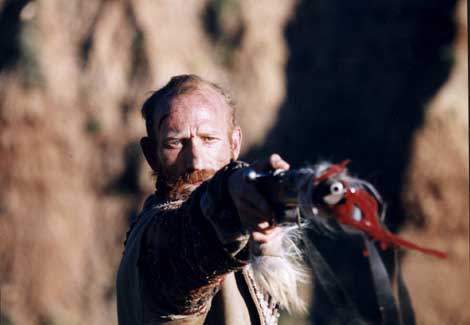 David Stratton, the critic for Hollywood Variety implies that “Dust” is replete with violence, so that it’s hardly believable that the western audience will accept it. Right here is the real reason for the negative reactions emerges (reactions rebuffed by Alessandro Baricco and by many regular viewers evaluating “Dust” on film web sites). It was the western cinema that invented film violence to satisfy the needs of western viewers. The Indians, or Russians, or Poles, or Japanese, or Macedonians did not invent film violence, and it is never put up on the screen for their sake. When an experienced critic attributes excessive violence to “Dust,” it cannot be a coincidence. In fact, there are 7 or 8 minutes of violence in “Dust,” as opposed to the 45 minutes of brutality in “Saving Private Ryan,” brutality that in Spielberg’s (excellent) film goes as far as hands and legs exploding all around; not to mention films like “Pulp Fiction,” “Schindler’s List” or “Seven,” Shakespeare’s bloody plays, or even the Bible for that matter. David Stratton feels free to employ double standards – one set for the Hollywood/western films, and another set for the films from other countries, i.e. “eastern films.” 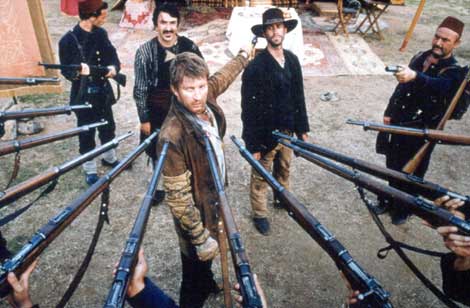 The arrogance of the Western pseudo-critics goes so far that they do not even try to conceal their racism and political agenda. The TV audience had the opportunity to see Alexander Walker from the London Evening Standard accusing Manchevski that he had made a racist film, showing the Turks “as herd of a corrupt people who gibber like apes in red fezes, and are more violent and far less responsible than Macedonians”. Walker then asked Manchevski: “I wander what you think the effect will be upon contemporary Turkey which is at the present moment trying to enter the European Union. Do you have a political agenda by this film?” (Manchevski only said: “Thank you for your statement.”) Those who have seen the film (a few thousand at festivals on three continents, and more than 70,000 in Macedonia, the only country where the film has opened in the theaters) can assess for themselves whether Walker’s claim that the film is racist is substantiated, or whether it is but a brazen forgery and callous attack. The viewers can see for themselves if “Dust” is a racist piece of art, or rather a film featuring both good guys and bad guys, blood-thirsty and innocents on all sides (of the ethnic divide). The film, actually, does not deal with ethnic issues at all; it deals with sacrifice and selfishness, regardless of ethnic colors. Anyway, even if it were a racist film (??!), it is unconceivable that a film may, even if it seeks to, stop a country from being admitted to the European Union. 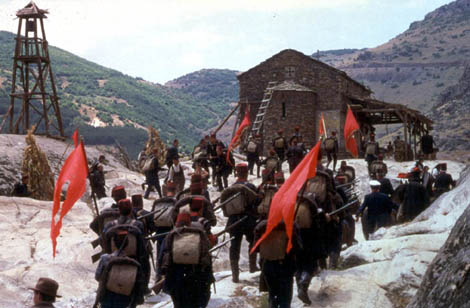 The British got carried away the most in the political showdown with the Macedonian co-production. Apart from Walker, Peter Bradshaw refers to “Dust” in The Guardian as “a special pleading for Macedonian nationalism.” In Macedonia nobody took up arms on seeing “Dust.” On the contrary, many had already taken up arms paid for with The Guardian journalists’ tax money. Those who’d taken up arms had been trained by The Guardian journalists’ fellow citizens. These reporters display knee-jerk negative reaction to a film trying to portray the relativity of recounting history when it’s written by the mightier, a film stating loud and clear the historical fact that Macedonians have suffered at the hands of ravaging Albanian gangs. 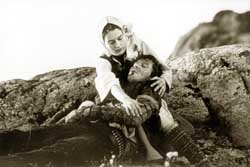
Macedonian philosopher Katarina Kolozova had a similar experience with her renowned colleagues. A philosophical article she wrote was unexpectedly blasted by an eminent Paris professor who referred to it as “nationalistic.” After one looks at the topic of the article, things become clearer. Kolozova argues for equality of the intellectual discourse and ideas coming from the small countries and those in the West. Kolozova is among those theoreticians (such as the Bulgarian Marija Todorova and the Slovene Slavoj Zizek) who contend that small countries are entitled to independence in assessing their own image, and who oppose the patronizing attitude of the West. Many highly acclaimed Western minds are not ready to come to terms with this attitude of the “natives.” Innocent Lambs and Blood-Thirsty Murderers. Why did Western journalists fail to see an apolitical film (which tells tales of adventures, cowboys, speaks of history, love, suffering and of the power of storytelling)? Why did they interpret this film as a contemporary political parable on the situation in Macedonia? Several Italian and German critics contend that all Westerners in the film are shown as bad, as if the good Angela and Elijah are not Americans, and the blood-thirsty Major and the Teacher are not from the Balkans (one a Turk, the other a Macedonian). Maybe this is but a reflex which has to do with the old skeleton in one’s closet. 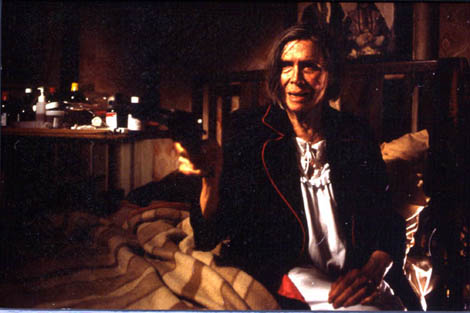 Things finally become crystal clear when put in context. The German “critic” Jan Schulze-Ojala in Der Tagesspiegel says that “Dust” is an illustration of Manchevski’s newspaper article “Just a Moral Obligation,” as if the director could write a screenplay, shoot and edit a film in two weeks, a process that usually takes two years at least (in the case of “Dust” it took as many as seven years; as a matter of fact the film was conceived – AND FILMED before the war in Macedonia even started). The same critic further claims that the film is anti-Albanian because “Instead of the Albanian Muslims we have here the Ottomans as the ‚untermenschen‘ and the Macedonians are as innocent as lambs, who are slaughtered during the film numerously. And the black boy whom the old woman explains the Balkans to, is nobody else than the West, who has to be waken up by the sounds of the fanfare and fight against the everlasting Osmanic Islam. The killerface aesthetic with which the Turks are portrayed does have - and that is the scandal – something (neo) fascistic about it”. Talk of projecting!  Claiming that Manchevski with “Dust” ilustrates the war in Macedonia, the critic of the London Times, James Christopher, says :”Manchevski hits important nerves but his politics, like twin stories, are all over the place. True, Dust is not a piece of ‘realist’ cinema, but having placed his film in the teeth of a deadly serious conflict can he really shrug off the responsibility?” He, however, does not mention that the conflict the film speaks about is over 100 years old, and that this new war in Macedonia, which is different from the one a century ago, happened AFTER the film was made. The Croatian Jutarnji List, one month before Venice, published vitriolic criticism written by the prominent Bosnian writer Miljenko Jergovic (who had fled Sarajevo when it was under siege), accusing Manchevski of “Macedonian nationalism, failure to understand the historical situation of the Albanians...” Jergovic did not note that he himself had not been to Macedonia. As if to continue the political fuss engulfing the film, the most frequent questions in the numerous interviews Manchevski gave in Venice (at least 120 for several countries) had to do with the political crisis in Macedonia. The film was seen through the prism of politics. Even at the gala entrance preceding the opening of the festival, an occasion generally used for glamorous show-biz fluff, Manchevski was asked about the fate of NATO troops in Macedonia (whereupon he answered that those who distributed arms to the militants are now collecting them back). The day after the opening night of “Dust” in Venice, the Associated Press agency released the (erroneous) information that Manchevski was retiring from directing. 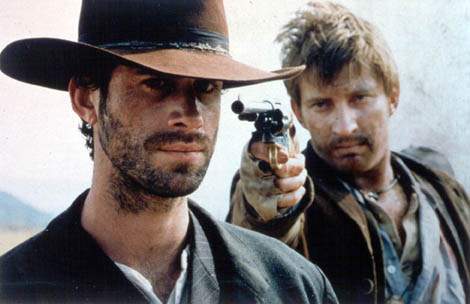 Finally, has Macedonia learned its lesson from this battering? Has it learned that the mighty play dirty, and that they punch below the belt, and that when your fate is being tailored by the bigger and the mightier it is very important for the world to hear your side of the truth, no matter what the consequences? The case of “The ‘Dust’ Files” is telling because the Western media gave its bias away – and because the rest of us failed to use the opportunity to speak in a public place about our problems and about our truth. This distortion then becomes only a small piece in the mosaic of a political struggle. MACEDONIAN THEATRE PLATFORM STARTS THURSDAY. MIA 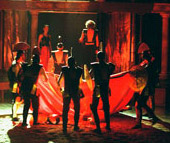
The project "Macedonian Theatre Platform", which aims to represent the Macedonian theatre art to European and world audience, will take place on January 17-20.
The Theorem Association, with main offices in France, will also take part in this project. This Association, established in 1998, comprises about 40 West-European theatres and festivals with a joint aim to support the work of young East-European artists. Its activities bring closer the theatres from the West and East Europe.
Some 15 important theatre professionals and managers of famous European festivals will participate in this Platform. They are to hold meetings with representatives of the Macedonian Theatre, Directors, Drama authors and with representatives of the Macedonian Ministry of Culture.
The Platform starts this afternoon with "The Diary of the Insane", a monodrama based on the scripts of Nikolaj Vasiljevic Gogolj, directed by Ivan Popovski, and performed by Bajrus Mjaku. The play "Macedoine - Odyssey 2001", directed by Ivan Popovski, has the central point in the platform.
This grandiose project, performed for the first time at the Ohrid Summer 2001 Festival, is actually a co-production of the Drama Theatre - Skopje, Bitola Theatre, Drama Section at the Macedonian National Theatre and the Festival Young Open Theatre (MOT), which are also initiators of this Platform.
The play "Divo Meso" (Proud Flesh) by Goran Stefanovski, directed by Aleksandar Popovski, will be performed Thursday.
On Friday, the Theorem Association representatives will have the opportunity to see the plays "Tomorrow We Leave for Heaven", directed by Dritro Kasapi, in the production of the Albanian Drama Section at the Theatre of Nationalities, then "Candid in Wonderland" by Venko Andonovski, directed by Sasho Milenkovski and "The Balkans Is Not Dead" by Dejan Dukovski, directed by Aleksandar Popovski.
Some of the plays, in the production of the National Theatre Bitola, will also be performed on Friday: "Pecalbari" (Moneymakers) by Anton Panov, directed by Branko Brezovec and "Makedonska Krvava Svadba" (Macedonian Bloody Wedding) by Vojdan Chernodrinski, directed by Ljupcho Georgievski. The official part of the project ends with the performance of these plays.
On Sunday, upon A request of the Theorem Association representatives, the play "The late arriving bones" by Teki Dervishi, directed by Vladimir Milchin, in the production of the Albanian Drama Section at the Theatre of Nationalities.
The aim of the Macedonian Theatre Platform is affirmation of the Macedonian Theater Art at the European stage, creating opportunities for new contacts, c-productions and future cooperation. SALES AGREEMENT FOR PORCELANKA SIGNED. MIA 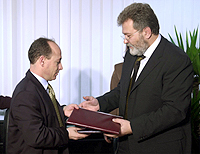
Macedonian Ministry of Economy signed Wednesday a sales agreement worth DM 300.000,00 with the Austrian Company Exclusiva from Vienna, referring to the ceramics factory in Veles, Porcelanka.
The Agreement was signed between the Minister of Economy, Besnik Fetai and the Exclusiva's representative, Jovo Vangelovski.
After the official signing, Minister Fetai announced that the total debt of this factory to the Government amounts to DM 3,700.000,00, which are to be returned within the next seven months.
"The new owner will pay DM 400.000,00 each month, covering the taxes and duties towards the Government," said Fetai.
Fetai stressed that all 670 employees in the factory will remain at their working positions, some investments for normal functioning of the factory will be made and even more, some new employment opportunities are planed.
The President of Porcelanka's Workers' Union, Zvonko Samardziev, pointed out to the fact that in case the factory was closed, the Government was to pay out the employees, which would have amounted up to total DM 7,2 million. N. Mihailova on Leading Position in Stability Pact. Standartnews 
Erhard Busek discussed the candidacy at a working breakfast in Sofia.
Elena Yaneva
Pavlina Zhivkova
Former Foreign Minister Nadezhda Mihailova is most likely, to be elected regional co-ordinator of the Stability Pact for Southeastern Europe, 'Standart' learnt. Her candidacy had been discussed at a working breakfast by Erhard Busek - chairman of the Pact, and Bulgarian businessmen and politicians. Representatives of 'Vazrazhdane' (Revival) club also attended the breakfast. Mihailova's candidacy is consolidating, since she has a good reputation within the governments of our neighboring countries. She has proved to have all the qualities of a diplomat and negotiator in complex situations, maintain participants in the working breakfast.
(SH) Bush Prises Bulgaria and Keeps Silence about NATO. Standartnews American president George Bush received ambassador Richard Miles in Washington. The diplomat informed Foreign Minister Solomon Passy about his meeting in the USA yesterday. During my meeting with president Bush no official statement about the nomination of Bulgaria for NATO was made, Mr. Miles said. Yet he reminded that the US administration encourages our aspirations for the NATO membership. The USA highly values the role of Bulgaria in the region, ambassador added. PM to Decide on Ministers' Resignations All by Himself. Standartnews Nadelina Aneva
It is only the head of the government, Simeon Saxe-Coburg-Gotha, who is authorized to ask members of the cabinet to resign, said yesterday NMS PG Chairman Plamen Panayotov. To him, there is no reason reshuffles of ministers to be discussed by the Parliamentary Group. Yesterday, Finance Minister Milen Velchev came to the National Assembly to meet Panayotov but the meeting was postponed. There are no grounds the PG to be considered unstable, no one manifested intention to leave it, the PG Chairman said further. First Euro Coins Distributed in Bulgaria. Standartnews Bank officer is the first Euro coin owner in Bulgaria. Hristo Traktorski received the symbolic coin at an official ceremony in Hebrosbank, Serdika filial. The bank delivered 1 euro to 500 of it's clients, who had already opened accounts in the new European currency. These are also the first coins of the sort, to be put in circulation in this country. Hebrosbank CEO Guatam Vir, said that the bank has opened 10,000 accounts in euro only for November and December'2001. The BGN equivalence of the bank operations exceeds 30 million levs. Resignations of Katsarchev and Revizoro Demanded. Standartnews Heads of the Financial Intelligence and Tax Office are to be found out.
Stephan Kioutchukov
The trade unions insist on the resignations of Atanas Katsarchev - deputy-minister of finance, and Emil Dimitrov - head of the 'Customs' agency, said yesterday Konstantin Trenchev - president of 'Podkrepa' LC, after his meeting with Finance Minister Milen Velchev. 'They are harmful to the image of the government,' Trenchev elaborated. The resignation of Katsarchev is required for the tension due to the last amendments in the tax acts, while Emil Dimitrov's should step out the office for the mass dismissals of customs officers. The Supreme Taxation Department's head will be appointed in a few days, said the minister. 'I hope, that soon the new director of 'Financial Intelligence Bureau' will be also appointed,' Velchev said. Sofia Gets on to the Business Map. Standartnews Well equipped new hotels in Bulgaria's main cities make it easier to take advantage of fresh opportunities there.
Financial Times; Jan 15, 2002
By THEODOR TROEV
A touch of royalty and the institution of a new government dominated by young, western-educated technocrats have put Bulgaria on the business map and are drawing European, American and Middle East executives to this Balkan country. Radisson and Hilton have recently opened new hotels in Sofia, the capital. The former king, Simeon II, recently became the world's first dethroned monarch to win back power through the ballot box to become prime minister. While living in exile in Madrid for several decades, Simeon Saxe-Coburg made a living as a businessman who sat on the boards of companies with interests in agriculture, industrial products, hotels and banking. He speaks eight languages and his government officials are recognised internationally as experts who can speak the language of business. Mr Saxe-Coburg has attracted back to Bulgaria a number of successful, business-oriented expatriates. They include Nikolay Vassilev, 32, the economy minister, who worked in London as an emerging markets analyst with Lazard Capital Markets, and Milen Velchev, 35, the finance minister, who was vice-president of Merrill Lynch's emerging markets unit in London. "It is much easier to communicate with these guys and to get no-nonsense answers," says a Greek investor who has settled in Sofia. He has been pleased by the new government's plans, such as to privatise remaining state assets quickly and to fight corruption.
"Until recently, most clerks would find a way to show you how they could 'personally' ease your way around the labyrinths of bureaucracy or help you to win a contract," says the investor. Such "personal offers" have diminished, he says. The promise to root out corruption helped the former king to win the election in June last year. Mr Saxe-Coburg said his administration would bring in strict procedures and "one-stop shops" for processing new investment. These procedures have already been visible at the customs, where a new chief has cracked down on organised smuggling. He also plans that only one state agency - compared with the current seven - should check imports and exports at the border, to cut corruption and bureaucracy. While driving into the country still takes longer at the borders compared with western Europe, arriving at Sofia airport is no longer a painful experience. The airport was recently modernised along European Union lines. No visa is required for EU citizens. Many big European and Middle East airlines fly to Bulgaria. The country's own carrier, Balkan Airlines, ran into financial trouble and stopped operating for a few months last year but has now recovered some of its scheduled flights. On arrival, buy supplies of duty-free drinks. Whisky is the business drink and you may find that getting closer to local partners requires some drinking sessions.
Sofia's newest hotels, the Radisson and the Hilton, both offer transport from the airport. They compete with the Sheraton Sofia for business travellers. The newly built Hilton - with well equipped meeting halls, up-to-date business facilities and panoramic views - was where Mr Saxe-Coburg announced his policies during the election campaign. Last week he opened the country's first international tourism conference there. The Radisson SAS, the refurbished former Grand Hotel Sofia, stands in the city centre, opposite the parliament and the Alexander Nevsky cathedral. It has its own touch of royalty: Jesper Larsen, the executive chef of its Alexander's Place restaurant, has been a cook to the Queen of Denmark. His European, South American and Asian dishes, combined with the best Bulgarian wines and served with style, make the restaurant a useful venue for formal business lunches and other events. Other convenient features make the Radisson one of the favoured meeting places for the country's new administration and businesspeople. The less formal Flannagan's, an "Irish pub" next to the hotel's lobby and all government organisations are within five minutes' walk; the opera, theatres, museums and coffee shops are also within walking distance.
"In Sofia I feel (as if I'm) in a little Vienna - but with a Mediterranean touch of warmth, hospitality and joy of life," says a British businessman who has settled in Bulgaria. "I have managed to make real friendships with the local people and I do not feel a stranger here at all." He, like most foreign residents, feels as secure as local businessmen do, as long as common sense is used - such as omitting to drive luxury cars along minor roads late at night. Driving carefully is essential at any time of day, as the number of road fatalities is high. One of the foreign visitor's favourite places for short breaks with colleagues is Plovdiv, Bulgaria's second city, the Roman capital of Thrace under the name Trimontium. Some 120km by road from Sofia, it has an old quarter with picturesque houses from the 18th and 19th centuries and restaurants with local specialities. Many business travellers visit Plovdiv for the twice-yearly week-long international trade fairs. One of the biggest events in Bulgaria's business calendar, it celebrates its 110th anniversary next year. The autumn fair focuses on technical exhibitions in sectors such as electronics, information technology, electrical engineering, chemistry and medical equipment; the spring fair exhibits consumer goods.
The Novotel-Plovdiv is currently the only hotel in Plovdiv with both indoor and outdoor swimming-pools and has convenient conference facilities. Novotel-Plovdiv is the only 5-star hotel in the city. It is a franchisee of Accor Group and is the only hotel in the city with a central air-conditioning system and internet access in the rooms. Its conference halls are suitable for organising conferences, business meetings and presentations. The Novotel's Business Centre is equipped with facilities for word processing and sending and receiving faxes and has direct internet access. For an authentic old town experience, the Hebros hotel is almost 200 years old, with appropriate furniture and atmosphere and a restaurant with a pleasant garden. The recently privatised and refurbished Trimontium Princess hotel and casino is another choice for travellers seeking style. The Turkish investor, Sudi Ozkan, owner of the Princess hotel chain, has mixed Monte Carlo grandeur with the Oriental warmth of Plovdiv at the 45-year-old hotel. RUSSIA-BULGARIA. BTA Bulgaria and Russia to Sign Agreement to Relax Visa Regulations.
Sofia, January 16 (BTA) - Bulgaria and Russia are expected to sign an agreement January 31 to relax the reciprocal visa regulations, and make it effective as of the beginning of March. This was announced to the press Wednesday by Russian Ambassador here Vladimir Titov after a meeting with Economy Minister Nikolai Vassilev.
The two met to discuss the upcoming official visit by a Bulgarian delegation leaving for Moscow on Sunday.
During the visit the two sides are expected to set the exact dates for a session of the mixed commission for economic, scientific and technical cooperation. Bulgaria suggests that the commission meet in the third week of February, Vassilev said.
The commission is co-chaired by Vassilev of the Bulgarian side and Russian Deputy Prime Minister and Finance Minister Alexey Kudrin of the Russian side.
In Moscow, the Bulgarian Economy Minister is scheduled to meet with Kudrin, with the Ministers of Energy and Nuclear Energy Industry and other members of the economic team of the Russian government. He will also confer with representatives of large companies with interests in Bulgaria, including LUKOil and Gazprom, said the Russian diplomat.
Vassilev's programme features meetings with Moscow Mayor Yury Luzhkov and former prime minister and foreign minister Evgeny Primakov, who is now president of the Russian Chamber of Commerce and Industry.
The two sides have on their agenda for the visit 15 fields of shared interest, including economy, trade, business and investment opportunities and finance, said Vassilev. Ambassador Titov added that they "won't dig into the problems but will outline spheres of cooperation for several years to come".
Taking a reporter's question, he said that a trilateral meeting on the Bourgas-Alexandroupolis pipeline project at the level of deputy ministers is scheduled for late January.
Nikolai Vassilev is going to Moscow with a 60-strong business delegation put together by the Bulgarian Chamber of Commerce and Industry.
At the end of this month Russia will also be visited by Bulgarian Foreign Minister Solomon Passy. BULGARIA-LIBYA. BTA Foreign Minister Solomon Passy Meets with Libyan Ambassador to Sofia.
Sofia, January 16 (BTA) - Meeting with Libyan Ambassador Farag Gibril on Wednesday, Foreign Minister Solomon Passy suggested that an expert working group meet in Sofia to prepare a session of the Bulgarian-Libyan joint commission on economic, industrial, trade and technical cooperation, BTA learned from the Foreign Ministry's Information and PR Directorate.
The session will be held in Tripoli in late February or early March. The Bulgarian co-chair is Deputy Prime Minister Kostadin Paskalev, and the Libyan co-chair is Deputy Foreign Minister Saad Mujbir.
The commission's latest session was held in Sofia in November 1999. A time-frame for the settlement of the Libyan debt of 290 million dollars was agreed at the 21st session in 1999. A trade agreement and an investment promotion agreement were signed. The agenda of the next session in Tripoli has not been decided yet.
Ambassador Gibril and Passy discussed various aspects of Bulgarian-Libyan relations, the Bulgarian chief diplomat told journalists. "Problems in bilateral relations have long been out of the question," Passy said, answering a question if the Libyan ambassador had pointed out any problems. The poem "I am a Bulgarian child" will remain in the spelling books. 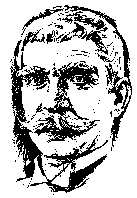
News.bg The poem "I am a Bulgarian child" will remain in the spelling books of the schoolchildren, Minister of Education and Science Vladimir Atanasov said to journalists. In his words, "This poem has been building Bulgarian national identity for many years, and as a researcher of the works of Ivan Vazov I believe that the name of the Patriarch of Bulgarian literature is a sign of spiritual and cultural identity and should not fall in oblivion." 2002: A year of uncertainty in the troubled Balkans. Ekathimerini By Stavros Tzimas-Kathimerini
A secession referendum in Montenegro, fragile peace in FYROM and a political vendetta in Tirana may spark more unwelcome conflict.
The peace agreement between Albanian rebels and the Slav-Macedonian-dominated government in FYROM is on shaky ground. Despite the efforts of Western diplomats, both sides deeply distrust each other, with the possibility that new clashes might erupt at any moment.
Important developments are in store this year for the southwestern Balkans, where the fragile calm could be disturbed at any moment by simmering tension.
Montenegro: Secession?
International observers have their eyes on Montenegro, where Milo Djukanovic has announced a referendum in the spring concerning secession from Yugoslavia. The result of the referendum may trigger developments throughout the area, if the majority votes in favor of independence for the tiny republic. Should this happen, and it is considered highly likely, Yugoslavia will collapse, setting off a chain reaction.
In Belgrade, President Vojislav Kostunica will be out of a job if the federation he leads - at least nominally - ceases to exist. The Kosovars in Pristina are waiting to raise the banner of independence, since the dissolution of the federation would nullify Resolution 1244 which links Kosovo to Yugoslavia; and in Bosnia the secessionist tendency in that fragile federation could gain strength.
The international community does not seem to be discouraging Djukanovic from taking the road to secession. Some observers wonder whether, in that case, a Bosnian entity could be established: For instance, Republika Srpska could hold a referendum about whether to become independent or unite with Serbia. But the Belgrade leadership does not seem overly concerned about the possibility that Montenegro might secede and Yugoslavia break up for the third time.
Serbia: Showdown
Kostunica and Serbian Prime Minister Zoran Djindjic have more serious matters to resolve, the first of which is their own coexistence. These two former allies in the operation to overthrow former Yugoslavian President Slobodan Milosevic are now being pushed to the political sidelines while the social and economic crisis spreads and their people slip further into poverty and hardship, with no sign of light at the end of the tunnel. As long as their underlying but tough battle for supremacy continues, Belgrade will be a source of instability in the region.
Elections for the Serbian presidency must be held this year, and Milosevic's close colleague, Serbian President Milan Milutinovic, has been charged with war crimes by the International Court of Justice at The Hague.
Observers expect a full-scale showdown between Kostunica and Djindjic. The former will probably seek election as president of Serbia but parliamentary elections might also be held simultaneously, so as to deal once and for all with an outstanding political issue which dominates Serbian life.
FYROM: An unstable peace
Further south, in the unstable area of the Former Yugoslav Republic of Macedonia (FYROM) and southern Serbia, peace hangs in the balance. The Ochrid peace agreement between FYROM's Albanians and Slav-Macedonians is ailing. Despite the efforts of Western diplomacy, both sides distrust each other, and the dangerous stagnation gives the impression that new clashes might erupt at any moment.
The Slav-Macedonian-dominated government is equipping the security forces with the latest Russian weapons, while, on the border, armed Albanian groups have created a de facto regime, preventing police from entering what those groups call free zones.
Though former rebel leader Ali Ahmeti and his comrades have exchanged their uniforms for civilian garb, they remain in Sipkovica and other mainly Albanian highland villages, waiting for the government to legalize their amnesty, which it has agreed on but refuses to give legal backing to. It would be naive to believe that these groups have not hidden weapons to use if necessary.
Moreover, in Tetovo not one night has passed since the peace agreement was signed without clashes between police and the Albanian groups who actually control the city. The press in FYROM has published stories speculating that armed action will resume in the spring, carried out this time by the "Albanian National Army," a group formed after the breakup of the Kosovo Liberation Army and which is preparing itself for battle.
The situation in FYROM is dangerously unstable, and there are fears that the elections to be held in 2002, probably in June, will increase the political tension, which could prove disastrous for the country, which is already suffering from the aftermath of war.
The international community is convinced that the situation in FYROM will not calm down if stability in Kosovo is not consolidated. The messages coming from Pristina do not permit those who have undertaken the task of establishing peace in the Balkans to relax their vigilance.
Kosovo: Political vacuum
There is a political vacuum in Kosovo, after the resignation of United Nations High Commissioner Hans Haekkerup and the inability of the Kosovo assembly to come to an agreement on a president. Ibrahim Rugova, leader of the Democratic League of Kosovo, won the election, but has failed to win adequate support in the assembly to form a government. Rugova, a moderate, is hostage to the aspirations of the former KLA leader and president of the Democratic Party of Kosovo (PDK), the second most powerful party, Hashim Thaqi, who wants to be prime minister in exchange for voting in Rugova as president.
"If a replacement for Haekkerup is not found soon and a government formed, there is a danger that everything that has been done so far will be destroyed," warned a European official in Pristina.
Albania: Vendetta goes on
In Tirana, the political vendetta in the ruling Socialist party between Prime Minister Ilir Meta and the party president, Fatos Nano, threatens to explode the calm which has prevailed of late in public life, and which had permitted the government to take some steps toward organizing state and economic development.
Political disagreements between the two Socialist leaders have taken on the character of personal hatred, and it is possible that elections will held in order to break the impasse, which could affect stability in this long-suffering country with its weak institutions.
Bulgaria: New Argentina?
Bulgaria surprised everyone last year, acquiring former King Simeon II as prime minister, and Georgi Parvanov, the leader of the ailing Socialist party, as president.
The new government's promises to develop the economy, stamp out corruption and put an end to poverty, which brought them a resounding victory in the elections, proved to be hollow, and the country is in danger of going the way of Argentina, as a large proportion of the population sinks into poverty.
Polls leave little room for optimism about the government's future and observers predict early elections.
Observers say that the many open fronts and unresolved issues in the former Yugoslav republics and other parts of the Balkan mosaic will maintain fluidity and could spark new crises.
The signing of the FYROM peace agreement created the impression that wounds had healed in the region and the illusion may have been enhanced when other places, such as Afghanistan and the Middle East, came into the spotlight following the dramatic events of September 11.
But dealing with unresolved issues in the Balkans is proving not to be so easy. Kosovo: A Fiasco. PRAVDA Timothy BANCROFT-HINCHEY
PRAVDA.Ru
The Albanians are unable to form a government in Kosovo, a province which never has been theirs, as the bickering and political in-fighting among the ex-terrorists continues.
The only candidate for the Presidency of Kosovo, Ibrahim Rugova, (Democratic League of Kosovo) has three times failed to receive enough votes to form a government. In last Thursday s count, he failed even to reach a simple majority.
The Albanians have so far refused to negotiate with the Serb coalition Return , which received 10% of the vote but has not been invited to form part of a coalition government.
The UN mission in Kosovo itself is still without a leader, after the abrupt departure of Hans Haekkerup.
The question of Kosovo, like the unbelievable NATO-led attack on the Federal Republic of Yugoslavia, which was combating international terrorism, backed in part by Osama Bin Laden s Al-Qaeda, is a fiasco. That Slobodan Milosevic should have been bundled out of the country in an act of kidnapping for fighting terrorist extremists in Bosnia and Kosovo is unacceptable.
Now Hashim Thaci, the ex-leader of the terrorist organisation UCK (Ushtria Clirimtare e Kosoves, or Kosovo Liberation Army) and as such a former terrorist, view for a spot in the more acceptable political limelight as Prime Minister of Kosovo , as if such a position ever existed.
Rugova will not allow this and for this reason, the destiny of the province of Kosovo as an independent state, a notion created by NATO and a grave mistake which will produce strong political ripples in the Balkan lake in the future, lies in the hands of a former terrorist (Thaci) and a political opportunist (Rugova). |



